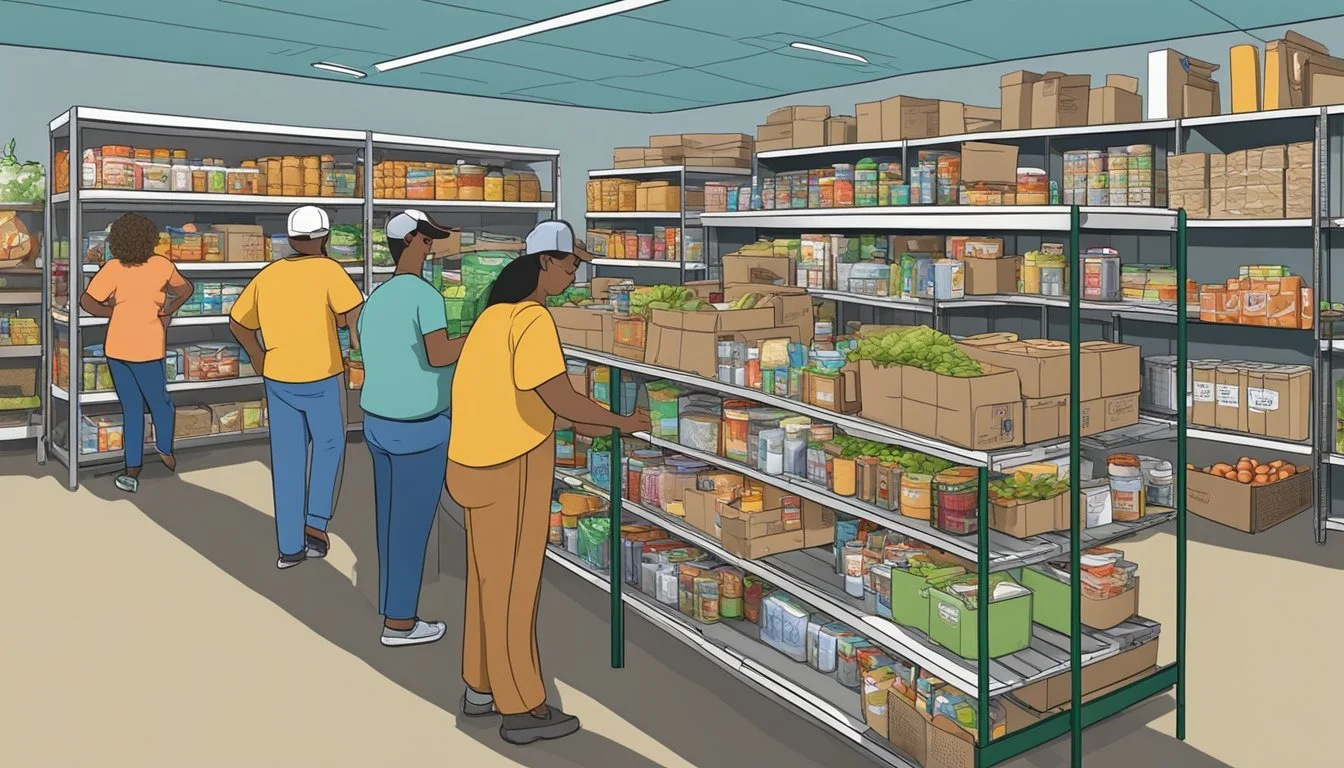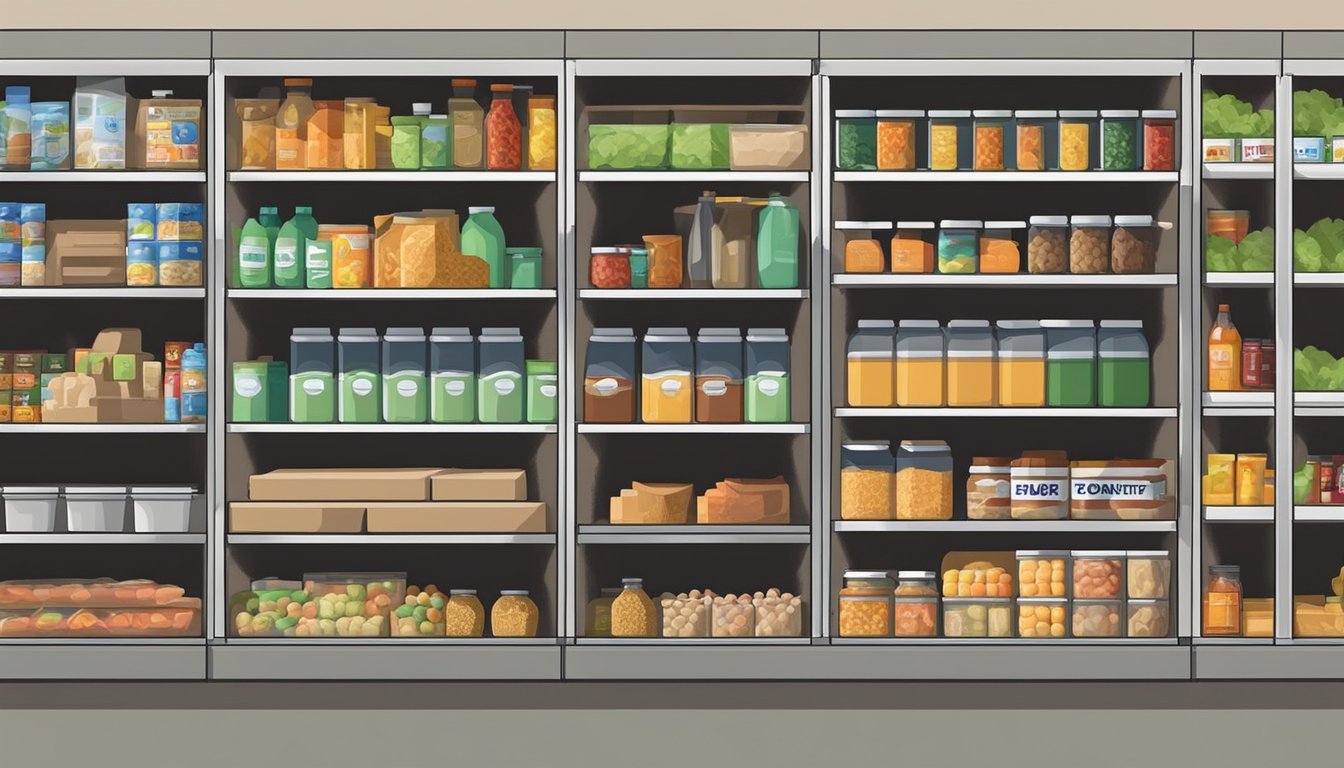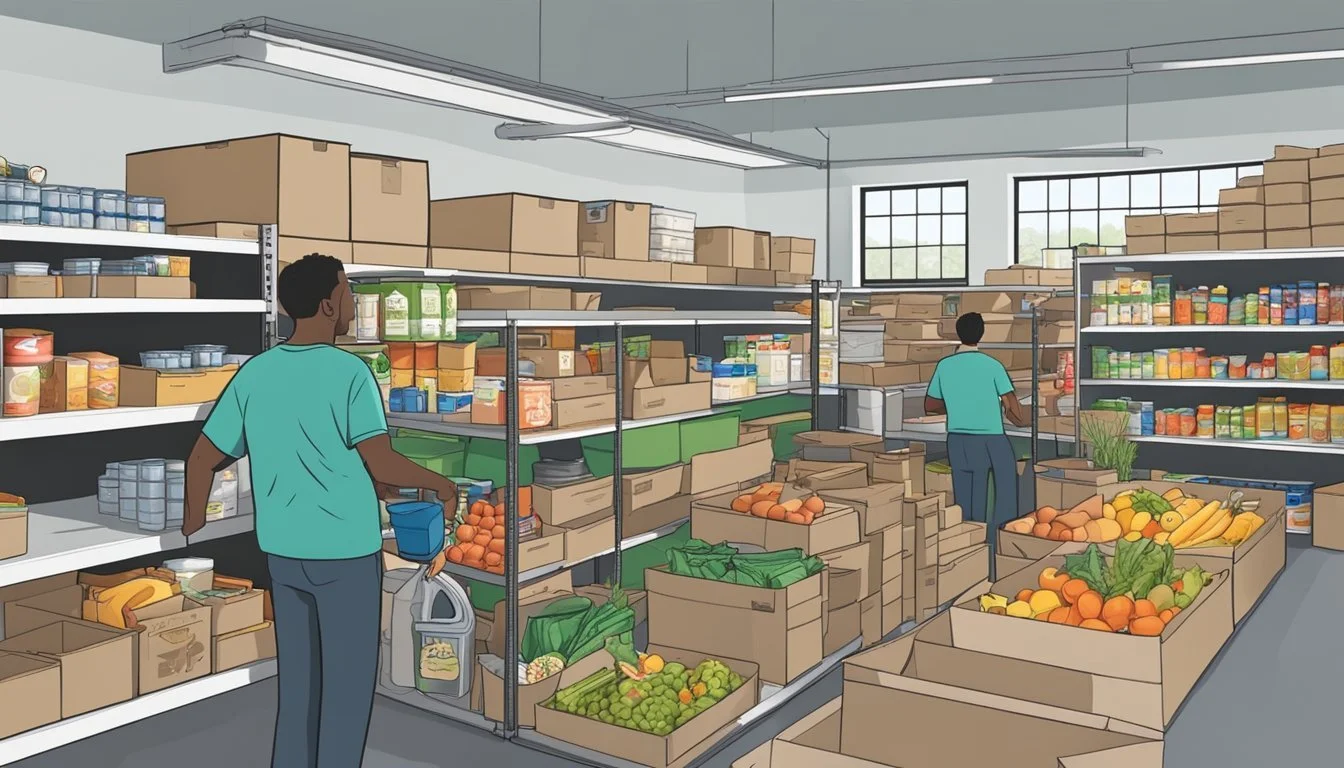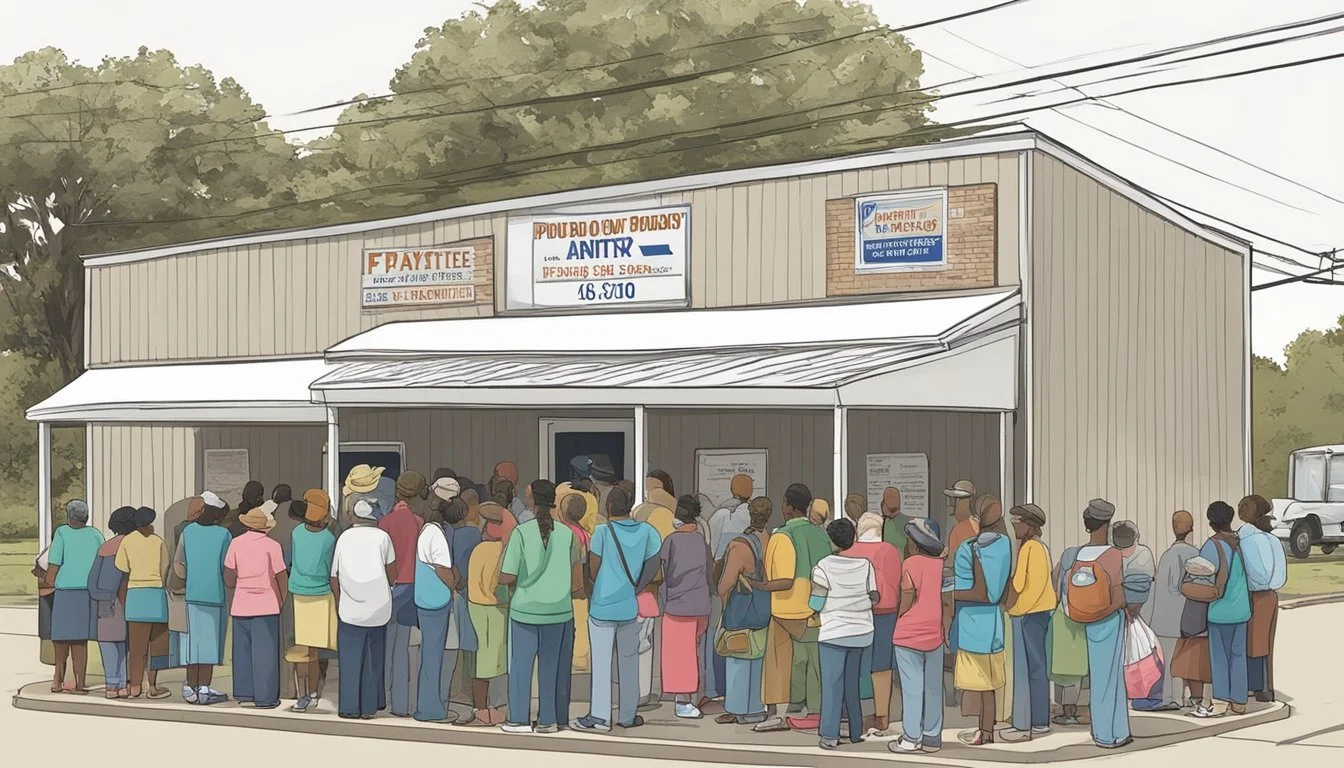Free Groceries and Food Pantries in Fayette County, Texas
Your Comprehensive Guide
This Article is Part of Our Guide on Free Groceries in Texas
In Fayette County, Texas, addressing food insecurity is a paramount concern for various community organizations and charities. These entities work tirelessly to provide free groceries and support to individuals and families in need. Food pantries serve as critical resources for residents facing economic hardship by offering food assistance and related services. While some pantries operate on a weekly basis, certain programs may also accommodate emergency needs or offer additional household items.
The collaboration between federal assistance programs and local food distribution efforts ensures that residents of Fayette County have access to nutritional support. Through a network of dedicated food banks and pantries, such as the Fayette County Food Pantry, community members can receive essential food supplies. This infrastructure, bolstered by both public and private support, helps counter the challenges posed by food scarcity.
Food pantries in the region typically facilitate distribution on set days of the week, and individuals can contact these pantries to understand eligibility and distribution schedules. Moreover, initiatives like drive-thru pantries provide a convenient and efficient method for families to obtain their groceries, meeting the evolving needs of the community with an emphasis on accessibility and dignity.
Understanding Food Insecurity in Fayette County
Food insecurity in Fayette County reflects a critical challenge affecting low-income families, children, and other vulnerable populations who struggle to access sufficient and nutritious food.
Importance of Food Assistance Programs
Food assistance programs are vital in Fayette County. They serve as a safety net for the community, ensuring that individuals and families with low income can access essential nutritional support. Programs such as food pantries and school lunch initiatives are often the difference between hunger and health for the needy and the homeless. Government benefits like SNAP and WIC give eligible participants the means to purchase food, while local food banks and charities provide direct aid.
Demographic Impact and Statistics
In Fayette County, the consequences of food scarcity disproportionately impact certain demographics. Children and infants are especially vulnerable to the adverse effects of food insecurity, with lasting implications for their growth and development. Statistical data indicates that one in seven people in the larger Kentucky region faces hunger, including a significant number of children. The unemployment rate is a critical indicator, as even a slight increase can lead to more families requiring assistance. These statistics underline the urgency of addressing food insecurity to support the health and well-being of Fayette County's residents.
List of Food Pantries in Fayette County
Residents of Fayette County can find essential support through a variety of food pantries, including those run by churches, non-profit organizations, and school-supported programs. These pantries provide invaluable resources to individuals and families in need.
Church-Based Pantries
Churches in Fayette County offer food assistance as part of their mission to serve the community. They often partner with local food banks to distribute food to individuals in different locations:
St. Mary's Food Pantry
Address: 123 Church Lane, Fayette, TX 78940
Partner: Local Food Bank
Grace Community Pantry
Address: 452 Grace Avenue, Fayette, TX 78945
Network: County-Wide Church Networks
Non-Profit Food Pantries
Several non-profit organizations operate food pantries in Fayette County. They work closely with food banks to ensure a steady supply of groceries for those in need:
Fayette Hope Center
Address: 789 Hope Street, Fayette, TX 78941
Zip Code: 78941
Network: Hunger-Free Fayette Partnership
Care Share Pantry
Address: 12 Caring Lane, Fayette, TX 78942
Local Food Bank: Central Fayette Food Bank
School Supported Food Distributions
Schools in Fayette County also participate in addressing hunger by running food distribution programs for students and their families:
Fayetteville School Pantry
Address: 350 Schoolhouse Road, Fayette, TX 78943
Partner: Non-Profit Organizations
Elmwood High Food Assistance Program
Locations: Various schools within the Elmwood District
Zip Codes: Served: 78944, 78945
Services Offered by Food Assistance Programs
Food assistance programs in Fayette County, Texas, provide a variety of services to meet the immediate needs of residents facing food insecurity. These programs are designed to offer immediate relief through various forms of aid, ranging from perishable food items to specialized nutrition for infants and children.
Emergency Food Pantries
Emergency food pantries offer bags of food that typically include a mix of nonperishable items and fresh produce. They are intended to supply individuals and families with food to cover short-term needs. Access to these pantries may require proof of residency in Fayette County or income eligibility, depending on the organization. The hours of operation and availability can vary, so contacting the pantries directly for schedules is advisable.
Soup Kitchens and Hot Meals
Soup kitchens provide ready-to-eat, hot meals to the needy, ensuring that those without kitchen facilities or those who are homeless have access to cooked food. These kitchens usually welcome individuals and families without the requirement of prior registration or documentation, offering an immediate response to hunger.
Specialized Programs for Children and Babies
Specific programs like WIC (Women, Infants, and Children) cater to the nutritional needs of children and babies through the distribution of baby formula and baby food. These specialized services prioritize the health of young ones to support their growth and development. Eligibility for such programs often includes mothers, expectant mothers, and families with children under the age of five.
Operating Hours and Distribution
In Fayette County, Texas, food assistance programs are structured to provide essential groceries to those in need, with specific operating hours designated for distribution. These pantries ensure that assistance is accessible through regular distributions and various events.
Regular Distribution Hours
The Food Pantry in Fayette County operates with fixed distribution hours. They welcome individuals requiring assistance once a month. The established hours of operation are as follows:
Thursdays: 9 AM to 11 AM
Note: Excludes national holidays
Special Events and Drive-Thru Pantries
Drive-Thru Pantries offer an alternative means of food distribution. They provide a convenient way to collect a variety of free food and groceries from the comfort of one's vehicle, enhancing ease and maintaining privacy. To locate a drive-thru pantry, one can connect with the local food bank using a zip code.
Special events may occur periodically, and these can offer additional or extended distribution times. These are typically announced by local food assistance organizations and may cater to a larger number of people or during times of increased need.
How to Access Food Assistance
In Fayette County, Texas, there are established avenues for individuals and families to receive food assistance. These services aim to address food insecurity through a network of support channels, ensuring that those in need have access to free groceries and food support.
Eligibility Requirements
For individual access: Residents of Fayette County must meet certain criteria to qualify for food assistance programs. Eligibility often depends on factors such as income, family size, and financial need. Most food banks and pantries serve those who fall below the poverty line or are in an emergency situation.
Proof of need: Applicants typically need to demonstrate their need, which can include showing identification, proof of income, or evidence of financial hardship.
Residency: Assistance is generally provided to those living within the bounds of Fayette County.
Application Process
Initial Contact: Interested individuals should begin by reaching out to local food banks or pantries. One can typically find contact information through community directories or online resources.
Inquiry Phase: A preliminary phone call or visit may be required to receive detailed information on the application process.
Documentation Submission: Potential recipients will be instructed to provide necessary documents such as ID and proof of income.
Food Banks and Pantries: Many food assistance venues may not require extensive applications and can provide immediate or same-day assistance in urgent cases.
Referrals and Community Help
Access through Referrals:
Community ministries and social service agencies within Fayette County often offer referrals to food assistance programs.
These referrals can be instrumental in guiding those in need to the appropriate resources.
Collaboration with Local Entities:
Food banks often work in partnership with community ministries to reach a broader demographic and ensure sufficient distribution of food resources.
Networking through churches, community centers, and non-profits can provide additional layers of support and information.
Seeking Assistance:
Entities such as the Fayette Resource Network and local food banks encourage those in need to contact them for more information on receiving aid.
Rigorous community networking ensures that individuals can find the right source of assistance for their specific situation.
Types of Food Available
In Fayette County, food pantries provide a variety of food options to meet the nutritional needs of the community. These pantries ensure that residents have access to both fresh and non-perishable food items, catering to different dietary requirements and preferences.
Fresh Produce and Perishables
Food assistance programs in Fayette County place a strong emphasis on offering fresh produce to ensure recipients have access to healthy food options. These typically include:
Fruits
Vegetables
Dairy products such as milk and cheese
Fresh meats like poultry and beef
Pantries often source these items through donations or partnerships with local farms and grocery stores.
Non-Perishable Food Items
For the sustainable support of those in need, pantries also stock up on non-perishable food items. These long-lasting staples include:
Canned goods (vegetables, fruits, soups)
Pasta and rice
Cereals and breakfast bars
Shelf-stable dairy products
These items are essential for creating a balanced diet and are often provided in pre-packed bags for easy distribution.
Special Dietary Needs and Allergies
Recognizing the diverse dietary requirements of the community, food pantries in Fayette County also strive to accommodate those with special dietary needs and allergies. Selections often include:
Gluten-free products
Lactose-free dairy alternatives
Low-sodium canned goods
Nut-free snacks
Pantries pay careful attention to food labeling and handling to prevent cross-contamination and ensure safety for individuals with allergies.
Supporting Food Assistance Programs
Fayette County's food assistance programs rely heavily on community involvement to continue serving those in need. The support comes in various forms, with donations and volunteers being the backbone of these initiatives.
Making Donations
Donations are a critical source of support for food assistance programs. Individuals and businesses can make contributions in several ways:
Monetary Donations: Monetary gifts provide flexibility, allowing food pantries to purchase high-demand items that are not often donated.
Food Donations: Non-perishable food items, such as canned goods, rice, and pasta, are always welcome.
Supplies and Hygiene Products: Besides food, items like toiletries, diapers, and clothing can also be donated to address a broader range of needs.
Community members interested in donating can contact local food pantries directly to learn about specific needs or drop-off procedures.
Volunteer Opportunities
Volunteers are indispensable in the operation of food pantries:
Sorting and Organizing Donations: Volunteers help by managing the influx of food and supply donations, ensuring a smooth distribution process.
Distributing Food: They may also assist with the direct hand-out of items during pantry operating hours.
Outreach Services: Some volunteers offer their time to inform eligible families about available services and programs, like SNAP.
Food pantries welcome individuals and groups looking to contribute their time and skills. Potential volunteers should reach out to their nearest food pantry for information on current volunteering needs and scheduling.
Additional Resources and Information
In Fayette County, Texas, residents in need of food assistance can access a variety of resources. These include local food banks, government programs, and a directory of services that facilitate connections to vital support.
Finding More Local Food Banks
Residents looking for additional local food banks can start with Find Food tools provided by Feeding America. This organization offers a searchable online database where individuals can locate nearby food pantries and obtain free groceries to meet their needs.
Government-Supported Programs
Government-supported programs like the Supplemental Nutrition Assistance Program (SNAP) are available to help individuals and families afford groceries. Interested applicants can learn more and apply for these benefits through their State assistance office. Additionally, organizations such as the Salvation Army and Catholic Charities offer food programs that are often in collaboration with Federal initiatives.
Directory of Services and Contact Info
For comprehensive information, the Fayette County Community Action Agency can be a primary contact point. They provide detailed directories that list local pantries, their hours of operation, and contact information. Here is a quick reference:
Organization Contact Number Operating Hours Fayette County Food Pantry (979) 247-4060 Thursdays 9 AM to 11 AM
Individuals can request assistance once a month from the food pantry. For further information, directly contacting the listed organizations is encouraged.










